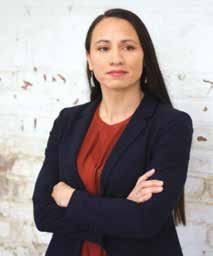 By John Lewis–
By John Lewis–
Who would have thought that of all places, Kansas would elect an openly LGBTIQ person to Congress before San Francisco did? Certainly not I—having grown up in Kansas City, Missouri, in the 1960s and 70s, just a stone’s throw from the Kansas state line.
But that is exactly what happened with last week’s election of Sharice Davids, a Native American lesbian attorney (and also former professional mixed martial arts fighter), to represent Kansas’ 3rd Congressional District, which includes Kansas City, Kansas and the Kansas suburbs of Kansas City.
How ironic. I met Stuart 31 years ago at a house party here in San Francisco when openly gay Supervisor Harry Britt ran for an open seat in Congress against then newcomer Nancy Pelosi, who, of course, made history herself as the first woman Speaker of the House. But during Pelosi’s tenure, San Francisco has not had the opportunity to elect an LGBTIQ person to Congress for over three decades.
From early on growing up, I knew I wanted to venture out from Kansas City. But many of my high school friends have deep family roots in the Kansas City area and stayed—many, in fact, moving to the Kansas suburbs that elected Davids. One of them is my friend Alex, a gay man who lives in Overland Park, cares for his elderly parents and regularly gets together with his numerous local extended family members spanning multiple generations.
I was particularly repulsed back in 2012 when Kansas Secretary of State Kris Kobach declared, after four states voted in favor of marriage equality: “If a person wants to live in a San Francisco lifestyle, they can go there … . If they want to live a Kansas lifestyle, they can come here.” How dare he tell LGBTIQ friends like Alex that they weren’t welcome in their own home?
Last week, Kansas voters sent Kobach a message when they embraced a classic San Francisco value—judging people by the quality of their character, not their sexual orientation—and elected Davids to Congress and rejected Kobach’s bid to become Governor. Indeed, Governor-elect Laura Kelly defeated Kobach by over 20 percentage points in Davids’ Congressional district. When I texted with Alex on election night, he exclaimed: “I’m ecstatic and beyond thrilled.”
Kelly’s election will have a direct positive impact on LGBTIQ Kansans. Back in 2007, Kansas Governor Kathleen Sebelius signed a critical executive order prohibiting discrimination against LGBT state employees. But in early 2015, Governor Sam Brownback rescinded the order, just three months after same-sex couples began marrying in the state—in the words of a Kansas City Star opinion piece “for no good reason other than spite and pandering.” Out LGBT state employees, who had just celebrated their new-found freedom to marry, suddenly feared for their jobs and livelihood.
Two days after winning the election, Kelly announced she would reinstate the executive order immediately upon taking office, and if possible under state law, direct adoption agencies with state contracts not to discriminate against prospective LGBT parents.
Davids faced attacks based on her sexual orientation and race during the campaign. An elected Republican precinct committeeman wrote on Facebook to a Davids supporter: “Your radical socialist kick boxing lesbian Indian will be sent back packing to the reservation.”
Davids set a very different tone in her campaign, and the electorate embraced it. On election night, she declared: “There are so many of us who welcome everyone, who see everyone and know that everyone should have the opportunity to succeed … . The core of this campaign has been about trying to figure out ways to make sure that as many voices and experiences as possible … are being heard by our elected representatives.” Earlier this year, Davids told The New York Times, “I think it’s important that the lived experiences and the point of view of LGBT folks be included in conversations that affect all of us.”

The Kansas City Star reported that, during the campaign, Davids met with LGBT youth at a local queer space, where she shared her coming out story, listened to the young people’s stories of bullying and comforted them. Davids herself faced housing discrimination because of her sexual orientation when she worked in South Dakota several years ago. Cassandra Peters, the youth program’s director, told the Star: “She took time to hug each and every one of them and take a picture with them … . And it was just so comforting for them to think this person is a politician and cares about them.”
And Kansas elected its first two LGBTIQ representatives to the state legislature last week as well.
Davids’ election demonstrates how far we have come as a community nationally and quite possibly points to the way forward for advancing LGBTIQ equality in an era when many fear the federal courts will become less friendly with multiple Trump appointees. As we wait to learn if the Supreme Court will decide whether federal law forbids employment discrimination on the basis of sexual orientation and/or gender identity as unlawful sex discrimination, Davids will now a have vote in Congress to make such protections explicit.
On election night, Davids told her cheering supporters, “I’m so excited about the fact that we have the opportunity to reset expectations about what people think when they look at Kansas.” I’m feeling a lot of hometown pride myself. It’s profound to me to have this degree of acceptance in my hometown, a place where I never imaged being openly LGBTIQ growing up. Kudos to Davids and Kansas for this victory.
Stuart Gaffney and John Lewis, together for over three decades, were plaintiffs in the California case for equal marriage rights decided by the California Supreme Court in 2008. Their leadership in the grassroots organization Marriage Equality USA contributed in 2015 to making same-sex marriage legal nationwide.
Recent Comments